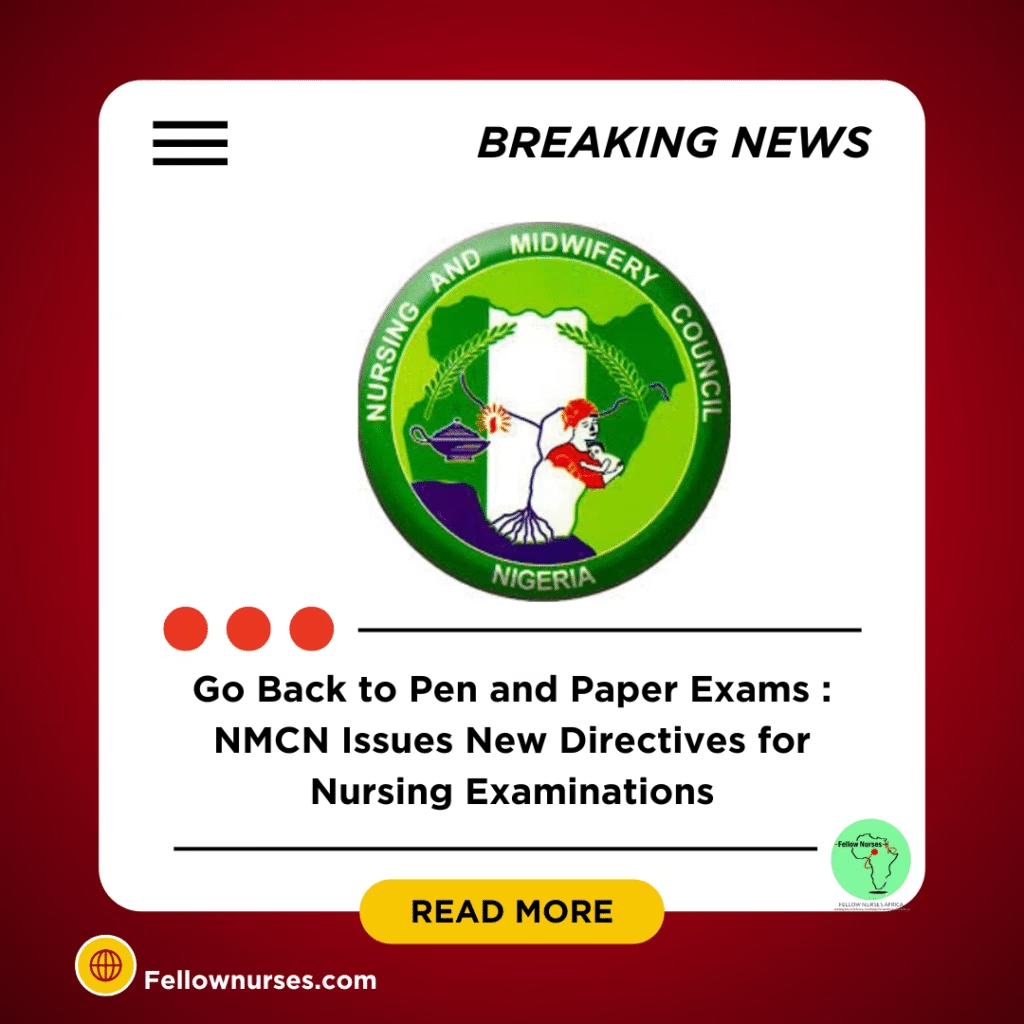Go Back to Pen and Paper: NMCN Issues Directive to Enhance Nursing Students’ Skills
Abuja, Nigeria – June 24, 2025 – The Nursing and Midwifery Council of Nigeria (NMCN) has issued a bold directive to nursing training institutions across the country, mandating a return to pen-and-paper examinations for internal assessments starting October 2025. The move aims to address concerns over declining reading, writing, and critical thinking skills among nursing students, attributed to the overreliance on Computer-Based Testing (CBT).

In a circular dated June 24, 2025, signed by Ag. Registrar/CEO Ndagi Alhassan, the NMCN expressed alarm at the gradual erosion of essential professional competencies due to exclusive dependence on CBT. While acknowledging CBT’s benefits—such as efficiency, fast grading, and prompt result release—the Council emphasized that it has negatively impacted students’ engagement with intensive theoretical learning and practical communication skills.
Key Details of the NMCN Directive
The NMCN’s directive, addressed to Commissioners of Health, Vice Chancellors, Chief Medical Directors, Directors of Nursing Services, and heads of nursing institutions, outlines a balanced approach to assessment to ensure academic excellence and clinical proficiency. Here are the highlights:
- Pen-and-Paper Exams Mandatory: Effective October 2025, all internal assessments in nursing training institutions must be conducted using traditional written examinations, except for pre-professional and professional examinations, which will remain CBT-based.
- CBT Limited to Specific Exams: Only pre-professional and professional examinations will continue to use the CBT format, ensuring students are prepared for technology-driven assessments while maintaining core skills.
- Practical Assessments Unchanged: Internal practical exams will continue to be conducted in hospital wards, allowing students to demonstrate clinical procedures. Pre-professional and professional practical assessments will adopt the Computer-Aided Objective Structured Clinical Examination (CAOSCE) format.
- Focus on Skill Development: The Council stressed the need for institutions to integrate theoretical learning and clinical practice to foster comprehensive reading, critical thinking, and writing skills.
- Timely Communication: Nursing institutions are required to submit examination schedules, including First Year first semester and pre-professional exams, to the NMCN promptly.
Why the Shift Back to Pen and Paper?
The NMCN’s decision stems from observed trends indicating that overdependence on CBT has led to a decline in students’ engagement with in-depth study. Skills such as thorough reading, effective writing, and clear communication—critical for nursing professionals—are reportedly weakening. By reinstating pen-and-paper exams, the Council aims to restore a balanced approach that prepares students for both academic rigor and real-world clinical demands.
“This directive is a wake-up call for nursing education in Nigeria,” said a senior nursing educator who requested anonymity. “While CBT has its place, we cannot sacrifice the foundational skills that make nurses competent and compassionate professionals.”
Implications for Nursing Institutions
The NMCN’s directive requires nursing schools, colleges, and universities offering Bachelor of Nursing Science programs to overhaul their internal assessment systems. Institutions must now ensure that faculty are equipped to design and administer written exams while maintaining clinical training standards. The Council also urged stakeholders to communicate the changes to all relevant parties, including students, faculty, and hospital management boards.
Nursing institutions have until October 2025 to comply with the new guidelines. The NMCN has called for cooperation from all stakeholders, including the National Association of Nigerian Nurses and Midwives, to promote excellence in nursing education and practice. The Council’s zonal offices are expected to monitor compliance across states and the Federal Capital Territory.
For nursing students, the shift may mean adapting to a more rigorous preparation process, balancing traditional study methods with CBT practice. However, many educators believe this change will better equip future nurses to meet the demands of patient care and professional documentation.
A Step Toward Excellence
The NMCN’s directive underscores its commitment to maintaining high standards in nursing education. By reinforcing pen-and-paper exams, the Council aims to produce well-rounded nursing professionals capable of critical thinking, effective communication, and clinical excellence.
Fellow Nurses Africa is the independent voice of African nursing, we educate, inform and support the nursing profession










